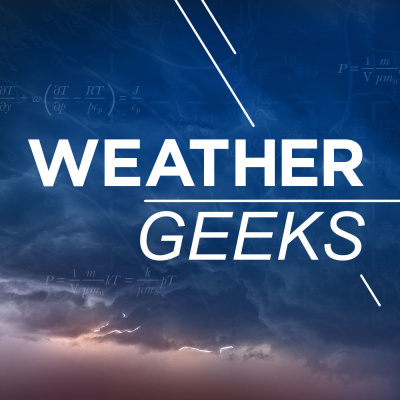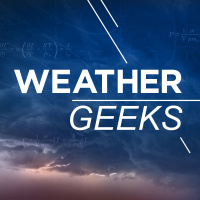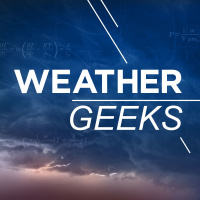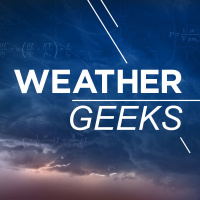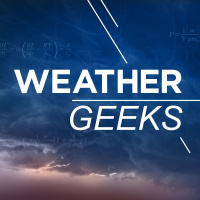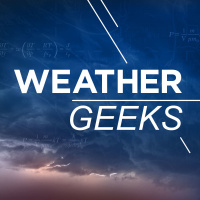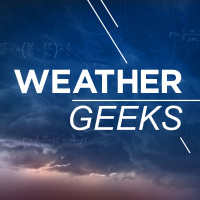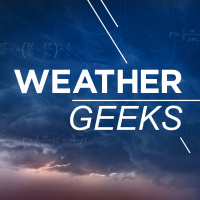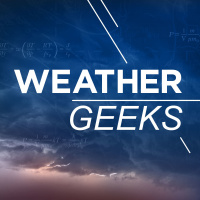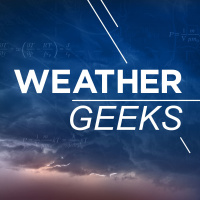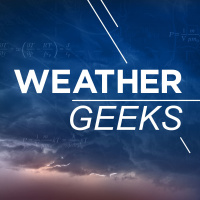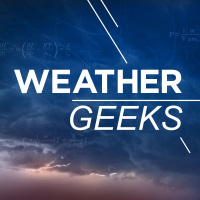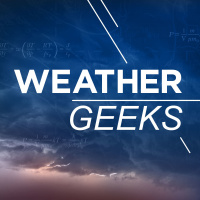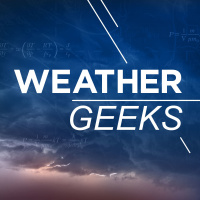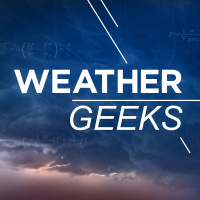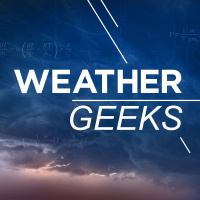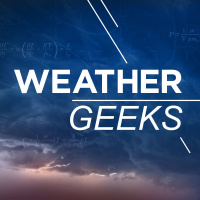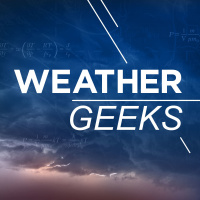Sinopsis
You see it every day. Its the subject of poetry, literature, art and film. It can inspire spiritual experiences, and it can destroy everything you have ever worked for. It is the weather, and no one knows it better than we do. Join us every week for the agony and the ecstasy of the one story that the entire world participates in and the science behind it. From the people behind The Weather Channel TV network.
Episodios
-
Surviving on Top of the World
12/08/2020 Duración: 35minGuest: Sean Swarner, Mountain Climber & Cancer SurvivorIntroduction:The odds that you will ever find yourself in the middle of a snowstorm in Miami, Florida are slim to none. Those are the same odds that young Sean Swarner had to survive when he was diagnosed with terminal cancer TWICE. He survived and wanted to seize the life that he was lucky to still have. Since then, he has climbed the highest peaks on all 7 continents, among other feats...while only having one lung. We are talking to him today about the grueling environments he was subjected to while pushing the human body to impossible limits.
-
In-Depth with the Hurricane Hunters
05/08/2020 Duración: 38minGuests: Richard Henning & Kevin Doremus, Hurricane HuntersAs we’ve highlighted nearly a hundred of times on this podcast, there is a lot more to meteorology than what you see on TV! A meteorologist can work in insurance, they can work for NASA, and they can work for airlines just to name a few. But one of the most important and dangerous jobs that is in the field of meteorology is that of a Hurricane Hunter. These brave men and women fly into the eye of a hurricane multiple times a day in order to bring back data that can help save lives. I have two of these men with me today, Richard Henning & Kevin Doremus, so we can get an in-depth look at the life of a Hurricane Hunter through their eyes...
-
-
Cloudy with a Chance of Pain
22/07/2020 Duración: 41minHave you ever heard someone say that they know a storm is coming because their joints start aching or they have a migraine? Well there is a scientific basis to that, but what about general pain receptors during common weather patterns? In past decades, it was difficult to answer such a general science question...but it’s not anymore! Today’s guest is Dr. David Schultz from the University of Manchester to talk about his study and how smartphones helped his team complete their research!
-
Highlighting Racial Challenges in STEM
15/07/2020 Duración: 44minThe racial injustices experienced by millions of Americans have been brought to greater attention in recent weeks. Among those Americans are members of our scientific community who have endured their own instances of racial discrimination along their paths to success. Many have felt marginalized, placated, and that they are often not being offered the same opportunities as many of their fellow white colleagues. Joining me today are 3 incredibly talented atmospheric scientists: Dr. Brad Johnson, Dr. Melissa Burt, and Tevin Wooten . While we each have had great achievements in our careers, we have still felt the added pressures of working twice as hard to be considered equals in our respective fields. Our goal in this discussion is to share the stories of our personal challenges throughout our careers and offer a guide for others to know they are not alone. The Weather Geeks team is proud to offer their support to our minority colleagues and show that by embracing diversity and inclusion, we
-
Weather and the Human Condition
08/07/2020 Duración: 34minGuest : Dr. Andrew Grundstein, UGAIntroduction: Many of us have seen first-hand the impacts weather can have on our daily lives, and today we’re going to focus on the dangers associated with heat and thunderstorms. Heat related illnesses are often underrated and sadly, this can lead to many trips to the emergency room...or worse. Today’s guest, Dr. Andrew Grundstein of the University of Georgia, has been focusing on one particular aspect of the heat: how it impacts athletes and children in hot cars. These situations can lead to dozens of deaths each year, so we’re going to discuss the meteorological and even some of the psychological factors at play in these events. Finally, we’ll discuss the impacts of thunderstorms on asthma...an idea which may be counterintuitive to many of you...
-
Rip Currents, Rising Tides, and Meteotsunamis… Oh My!
01/07/2020 Duración: 36minGuest: Dr. Greg Dusek, NOAA Ocean ServiceThe oceans hold more than 96% of the Earth’s water, and it’s the motions of those oceans we’re focusing on today! As people hit the beaches, many are unaware of underlying dangers lurking close to shore, and we’re not talking about JAWS… We’re talking about RIP CURRENTS, which lead to some 30,000 rescues EACH YEAR! Today’s guest is Dr. Greg Dusek, Senior Scientist at NOAA’s National Ocean Service, and he knows all about rip currents. We’ll discuss how to spot these hazards and how you can break the grip of the rip. We also couldn’t let Greg get away without discussing a few other topics, so if you’re already wondering what a meteotsunami is...we’ll get to those later. Let’s dive in!
-
The Weather Out West
24/06/2020 Duración: 40minGuest: Dr. Daniel SwainIntroduction: If you’re not from California, what is the first thing that comes to mind when you think of its weather? Severe droughts? Constant wildfires? 75 and sunny every single day? In any given year, those could all be correct! But what about over the past 30 years to create a climate normal? That’s where our guest today comes in… Dr. Daniel Swain is a climate scientist at UCLA and he’s been researching California’s weather patterns and finding the connections with our changing climate. From atmospheric rivers of moisture to raging wildfires, we’ll discuss why California and the West are so susceptible to these phenomena, and we’ll reveal the challenges that can come from studying these diverse, beautiful landscapes.
-
The Relationship Between COVID-19 and Climate Change
17/06/2020 Duración: 38minGuest: Dr. Aaron Bernstein, Harvard UniversityIntroduction: We all know that climate change has been detrimental to the health of our Earth, with increased deforestation and melting ice caps. But what about our own health? Or our children’s health? My guest today is Dr. Aaron Bernstein from Harvard University, who focuses on the health impacts of the climate crisis on children’s health and advancing solutions to address its causes to improve the health and wellbeing of children around the world. We are going to discuss this issue, especially related to our current COVID-19 pandemic and how that disease has a connection to our changing climate.
-
Are Floating Cities the Future of Hurricane Protection?
10/06/2020 Duración: 32minGuest: Marc Collins Chen, OceanixIntroduction: When a hurricane is fast approaching, experts always say that you have to fear the water, whether it’s rain coming down from the sky or the surge from the ocean or the flood from the rivers. What if I told you that my guest today has created a concept that would make you flock to the water and live a safer life from hurricanes? Marc Collins Chen is the CEO of Oceanix, a company that builds floating structures that can hold up to thousands of residents. Could Oceanix’s plan be the future of hurricane and climate change protection?
-
Professor, Author, and Atmospheric Model Extraordinaire
03/06/2020 Duración: 38minGuest: Dr. Adam Sobel, Columbia UniversityIntroduction: Most of the time when we bring someone on to Weather Geeks, they have a certain niche or a specific craft or an interesting line of research to discuss with us. But today, I have a guest with me who does it all! Dr. Adam Sobel is a professor of Applied Physics and Applied Mathematics and of Earth and Environmental Sciences at Columbia University. He teaches everything from tropical meteorology to climate thermodynamics to differential equations, so he’s certainly going to teach us Geeks a thing or two... about a thing or two!
-
COVID-19’s Impact on Pollution
27/05/2020 Duración: 37minGuest: Ryan Stauffer, NASAIntroduction: The COVID-19 pandemic has changed how we all live our lives, both in the present and in the future. We’ve all been stuck in our homes and adopted teleworking techniques in order to reduce as much time as possible with other people that may be sick. With these changes, we have noticed some positive impacts to our environment, including animals flocking to places they normally don’t and improved air quality in major cities. Today we’ve brought in Dr. Ryan Stauffer from NASA to discuss how this quarantine has impacted our current pollution output and how it is modeled out in the future.
-
Keeping Up the PACE with NASA
20/05/2020 Duración: 34minGuest: Ivona Cetinic, NASA OceanographerIntroduction: NASA does a lot more than mapping our solar system...they have also been mapping our oceans for over 20 years! The ocean is extremely important in our Earth’s health, circulation, and economy, so it is equally as important that our ocean is in good health too! In 2022, NASA will be launching the PACE mission, which stands for Plankton, Aerosol, Cloud, ocean Ecosystem, to further advance their understanding of our oceanic and atmospheric health. Today’s guest is Ivona Cetinic, who is the project science lead for Ocean Biogeochemistry on this mission and has devoted her entire career to better understanding our world’s oceans.
-
Communicating Climate
13/05/2020 Duración: 38minGuest: Bernadette Woods - PlackyIntroduction:The proper communication of climate science is just as important as communicating it at all! In an ever-changing world, keeping up with communication techniques is extremely important. The intersection of television and science has never been more vital than today! On this episode, we’re joined by Bernadette Woods Placky, Chief Meteorologist and Climate Matters program director, a division of Climate Central. As an Emmy Award winning on-camera-meteorologist Placky, can help us fully understand the line between proper and poor climate communication techniques!
-
Mitigating Disasters & Their Impacts on Society
06/05/2020 Duración: 38minGuest: Dr. Stephen Strader, Villanova UniversityIntroduction:Hurricane Harvey...Hurricane Dorian...the deadly Camp Fire...the devastating Super Tornado Outbreak of 2011… These disasters likely bring to mind the powerful images you saw from communities hardest hit by these extreme weather events. In a world with an increasing number of disasters, it’s becoming more apparent that we need to work to understand our own vulnerabilities so we can prevent future disasters. Today’s guest is Dr. Stephen Strader, Assistant Professor of Geography and the Environment at Villanova University. In addition to his knowledge of the atmosphere, his work also focuses on the hazards and risks associated with extreme weather. We’ll discuss the various tools he uses to determine areas at risk, as well as ways we can understand and prepare our society to reduce future effects of disasters.
-
Radar Meteorology & Observations of Severe Storms
29/04/2020 Duración: 41minGuest: Stephen Nesbitt, University of IllinoisIntroduction:Today we’re happy to welcome Professor Stephen Nesbitt from the University of Illinois. Dr. Nesbitt has his hands in a variety of projects & research interests, including mesoscale and cloud dynamics, radar and satellite meteorology, and tropical meteorology. His extensive field research has taken him to 5 continents for more than 20 field campaigns! One such project required his team to travel to Argentina & Brazil to study some of Mother Nature’s fiercest thunderstorms. We’ll also learn more about the great Atmospheric Science program at Illinois and learn about new and exciting projects he has planned in the future.
-
The Science of Climate Drawdown
22/04/2020 Duración: 37minGuest: Dr. Marilyn Brown, Georgia Tech Introduction: The word “drawdown” is used in multiple fields, from banking to investing, but for today’s episode, the most important use of the word is in climatology. Climate drawdown is the point at which greenhouse gas concentrations begin to decline on a year-to-year basis in order to reach carbon neutrality. The United States still has to take many steps in order to achieve drawdown, but there are many teams of brilliant scientists across the country that are putting solutions on the table to make this goal attainable. One of those brilliant scientists is my guest today, Dr. Marilyn Brown from Georgia Tech.
-
Severe Storms & Tornadoes - Ties to Climate Change
15/04/2020 Duración: 44minGuest: Dr. Harold Brooks, NSSLIntroduction: The United States is known to produce some of nature’s most severe weather as it allows for just the right ingredients to come together. As extreme weather becomes a more common occurrence, many have begged the question: Will we see more severe storms and even tornadoes as our world continues to warm? Today’s guest is Dr. Harold Brooks of the National Severe Storms Research Lab, and his research seeks to help answer this very question. His extensive background in severe weather has offered him the opportunity to study these changing trends in tornadoes and severe storms in recent decades. While storms may be getting worse, the exact answers of what we can expect in the future are more complicated than you think. Let’s dive in!
-
With Severe Weather, Anything GOES
08/04/2020 Duración: 38minGuest: Dan Lindsey, GOES-R Program Scientist Introduction: While the debate of “model wars” continues into the new decade, the satellite technology that the United States has advanced over the years is second-to-none! Being able to see the atmosphere from a top-down view has changed the way that meteorologists around the world can forecast the daily weather. They can see where severe storms are to provide up-to-the-second forecasts in order to keep people safe. One of the men behind these great satellites is here with me today. Dan Lindsey is a research scientist at NOAA and he was at the forefront of one of the latest major satellite launches, the GOES-16 geostationary satellite.
-
Flooding from a Hydrologist’s Perspective
01/04/2020 Duración: 36minGuest: Michael Kane, Water Resources EngineerIntroduction: Hydrology is the study of the movement, distribution and management of water on Earth, including the water cycle, water resources, and environmental watershed sustainability. Hydrologists work with other scientists to investigate how water impacts their respective fields, so meteorologists and hydrologists have a special relationship. Meteorologists focus on the water coming down from the sky, and the hydrologists focus on what that water will impact when it hits the ground and where it will end up. What happens when there is too much water and flooding ensues? Hydrologist Michael Kane is my guest today and we are going to talk about that...
